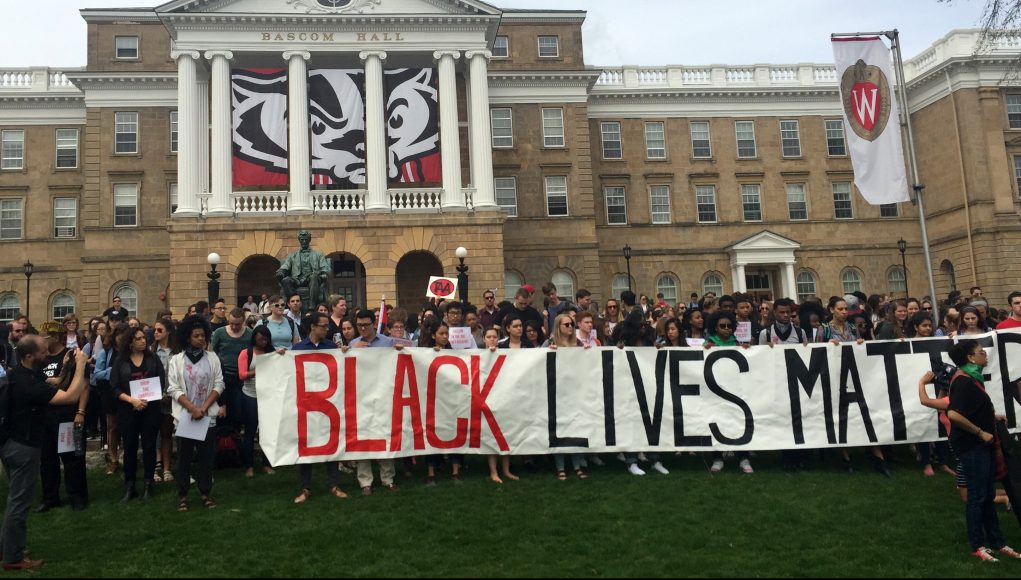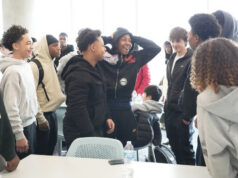As graduate students and instructors in the English department at UW-Madison, we were appalled to hear of the arrest of King Shabazz towards the end of the last school year. Many aspects of the arrest — the fact that Shabazz is an African-American student who was removed from an Afro-American studies class taught by a professor of color — spoke to the deep racism that riddles our campus and community. Shabazz’s arrest for allegedly creating anti-racist graffiti (an art form that has a long, global history of anti-racist protest) only brings the institutional racism into greater relief.
We would like to take this opportunity to communicate our support of the demands made by the Afro-American Studies department in their recent open letter, as well as the demands of the broader UW and Madison communities. We stand in solidarity with these demands and their anti-racist critique. Though it has been more than two months since the actual event, the issues it made visible remain unresolved. These are not issues that can’t be fixed with an open letter or statement of solidarity, though these statements are important, but require long-term work and commitment to racial justice by the institution of UW-Madison. As we prepare for the next semester, when conversations about the way the university will respond to this and the broader culture of racism on campus will be addressed through institutional programs, the undersigned graduate students of the English department wish to take an active step toward making classrooms at UW-Madison safe and just.
In addition to conveying our support of the demands of the Afro-American Studies department, we would also like to take this opportunity to address some additional concerns that we believe contribute to the hostile climate that made this traumatic event possible — and to offer some ways that graduate student workers and Humanities departments more generally can work toward racial justice at UW-Madison. This includes reimagining our assumptions about what classrooms and teachers look like, as well as committing to our shared responsibility for creating classrooms and campus communities where students of color can learn without fear of hostility or harassment.
First, Shabazz’s arrest indicates that the UWPD must rethink their assumptions on what teaching looks like on the UW-Madison campus. As the UWPD chief explained in her statement to the university, the two arresting officers were looking for someone standing in front of the classroom, but finding no “sage on the stage” they assumed that no class was being held. We wonder why Professor Almiron, a woman of color, was not recognized as the teacher and we wonder why the work taking place in her classroom wasn’t recognized as work. Unless there is an urgent need, the UWPD typically waits until class time ends to question or arrest students. But this policy fails when UWPD police officers assume what real teaching looks like, an assumption that doesn’t echo the realities of who instructors are or what we as instructors do in the classroom.
Classrooms are important spaces where teaching assistants and professors help students cultivate their knowledge and reach their full human potential. Teaching assistants and professors assist in this cultivation in a variety of ways. Lecture is one method of instruction, but increasingly instructors assign student-centered activities, such as small group discussions. These activities allow instructors to sit and speak with students one-on-one or in small groups, making our teaching personable while meeting the learning needs of many students. However, if these instructional methods are not easily recognizable as what college teaching looks like, our mission to cultivate students’ learning continues to be threatened.
Frequently, the learning spaces that we create as graduate instructors do not resemble traditional lecture models (nor do graduate instructors in the humanities always resemble the “traditional” older, white, male instructor). More often than not, our classes are smaller as well as discussion or workshop-based. It is crucial to recognize that nontraditional learning spaces — such as the one that the UWPD disrupted with their arrest — are some of the most productive educational spaces for social justice. This makes the UWPD’s violation of this space all the more reprehensible, but also suggests that as a community we need to reimagine the value of these nontraditional spaces.
As such, we hold that the small discussion-based classroom is essential to fighting racism on campus. Whether these are sections supplementing a large lecture course, composition classrooms, or seminars, these are the classroom spaces in which students at UW-Madison actually have the opportunity to actively engage in conversations about race and racism — and to be challenged by these discussions. Overwhelmingly, these classes are taught by graduate students, and we know firsthand the power they hold to open up communication and minds — and even to plant the seeds of social change. We also know the intense mental and emotional labor, especially by graduate students of color, that goes into shaping these tender and sometimes difficult classroom communities, mentoring students, and devising innovative lessons that will lead to substantive discussions about identity, politics, prejudice, and ethics. For many students, these small, discussion-based classroom experiences are rare and these will be their only opportunities within their university career to participate in, and learn from, discussions about race and racism.
This is why the graduate students of the English department strongly condemn the general push towards a model of higher education that sees students are consumers and learning is a commodity. We do not make cars. What happens in the small dialogic classroom has no exchange value. What we do in our classrooms is work toward a more democratic society by asking our students to think critically about the ways that race and racism shape our lives. Therefore, when we take away or devalue the small dialogic classroom, or ask instructors to take on more students, then we inhibit the pursuit of racial justice on campus. We have seen this firsthand working at the University of Wisconsin-Madison, where the concept of college instruction as a social good has been devalued by our current governor and state legislators. The graduate students of the English department recognize our responsibility as teachers of small classes to cultivate serious and substantive discussions about race and racism. We demand that the value of these small and often non-traditional classroom spaces be recognized, as well as the graduate student labor that makes these spaces possible. Let’s work together to help fulfill the potential of the small, discussion-based class as a site for social change, working toward democracy and by working against racism.
Finally, we believe the responsibility to address race and racism on campus should not solely rest on designated ethnic studies courses but must be shared by faculty and TAs throughout the campus. We wholeheartedly agree with the Afro-American Studies department when they call on the university to make the Ethnic Studies requirement meaningful. However, we also recognize that every classroom must work to be a space where racial justice can take place. This means making time for in-class discussion of racial climate on campus — especially when events like Shabazz’s arrest take place.
This also means creating curricula and syllabi that prioritize social justice and allow for productive spaces where students have the opportunity to actively learn about race and racism, as well as their intersection with gender, sexuality, religion, and class. We would like to offer our acknowledgement and support for the departments and instructors who often shoulder this labor, and state our commitment to redesigning our own classrooms and practices to be more responsive and just. English 101 and 201, as courses that meet the Comm A and B requirements, reach a significant number of students every semester, including freshman.
We would like to see discussions by leaders on campus about how the communication requirements could be part of the solution for the issues of racism that plague our campus, especially since their goals are to provide a “general foundation in the central skills and conventions required for student success in a variety of subsequent course work, as well as in careers after college.” Likewise, our introductory literary studies courses reach hundreds of students each semester. We believe that if these courses are to be meaningful, then they should also prioritize social justice as a core value of communication and the humanities.










